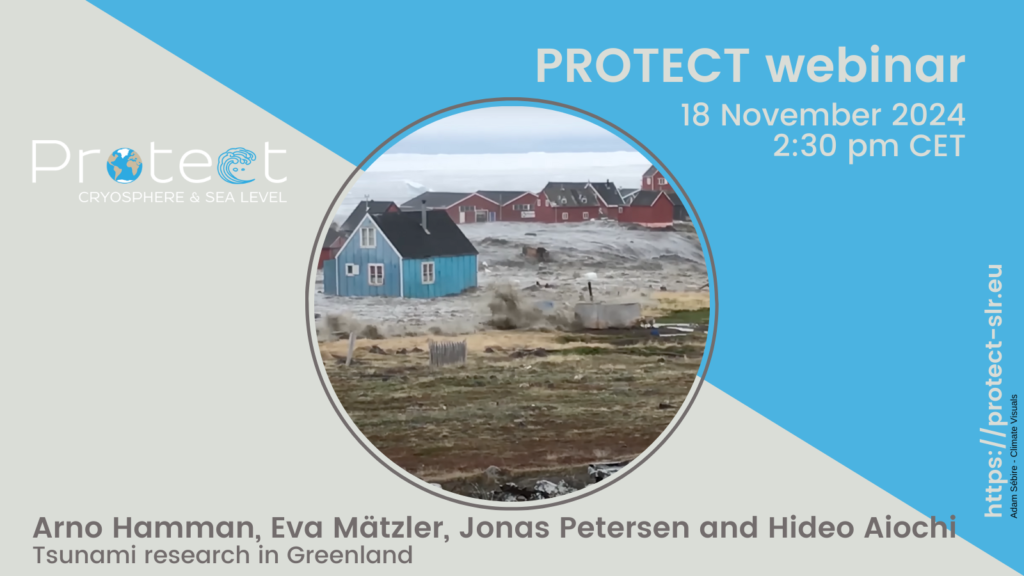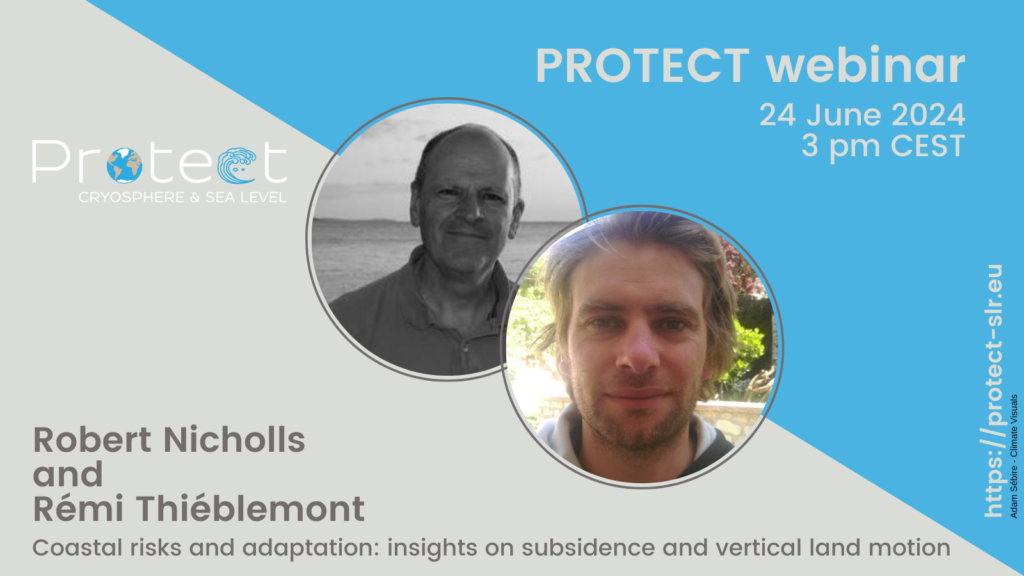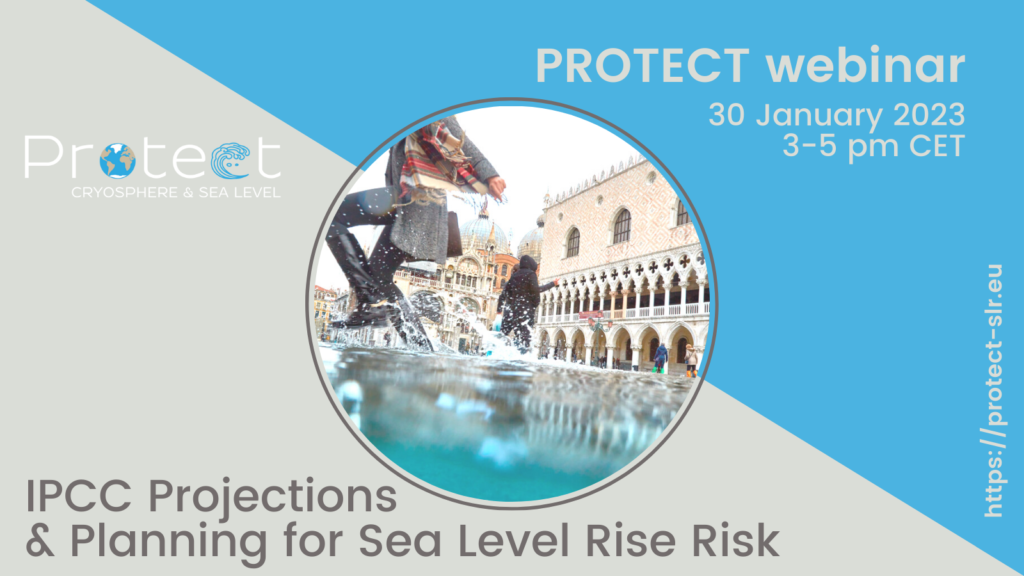1 February- 1 March 2025 – Submersion: an immersive art-science experience exploring ice loss and rising sea level
PROTECT proudly presents Submersion, an art-science exhibition shedding light on the impacts of glacier and ice sheet melting on rising sea levels.
Running from 1 February to 1 March 2025, at Espace Vallès in Saint-Martin d’Hères, Submersion merges cutting-edge scientific research with artistic expression. The exhibition is produced by PROTECT, ESAD Valence, and Alizée De Pin, author and illustrator, as part of a research-creation residency organized by Dominique Cunin, educator, researcher, and developer of augmented reality programs. This multimedia triptych invites audiences to explore glacial environments, envision potential futures shaped by rising seas, and reflect on individual actions influencing ice sheet dynamics.

Key Events:
- Exhibition Vernissage: 1 February 2025, at 18:00.
- Roundtable Discussion: 7 February 2025 full day at Musée de Grenoble. Free, registration required.
- Roundtable Discussion: “Art and Science Confronting Sea-Level Rise” on 10 February 2025, at 18:00, Grenoble INP – Ense³, UGA. Featuring artists and researchers from Submersion. Free, registration required.
27-29 January 2025 – PROTECT Final meeting
18 November 2024 – 2:30-3:30 pm CET – Tsunami research in Greenland
Speakers: Arno Hamman (ASIAQ), Eva Mätzler and Jonas Petersen (Government of Greenland), Hideo Aiochi (BRGM).
- Arno Hamman (ASIAQ): How ASIAQ is involved in PROTECT, what are their activities and role as a link between PROTECT scientists and greenlandic actors and topics of interest
- Eva Mätzler and Jonas Petersen (Government of Greenland): How tsunami models are used for mapping hazard zones in Greenland, and some thoughts how to move forward
Abstract: Since the fatal rock avalanche in the Uummannaq fjord system in 2017, other potential high-energy rock failures have been detected. The Greenland Government, with the lead of the Geology Department, installed and operates two monitoring systems in the region. We will present how tsunami models were integrated in the updated cascading hazard scenarios and how scientific collaboration could enhance future risk assessments and hazard mapping.
- Hideo Aiochi (BRGM): The developed methodology applied to the 2017 tsunami

24 June 2024 – 3-4 pm CEST – Coastal risks and adaptation : insights on subsidence and vertical land motion

Coastal subsidence and vertical land motion science to support climate change risk assessment by Robert J. Nicholls et al.
An understanding of vertical land motion (VLM) is critical to analyse the full risks and adaptation needs of climate-induced sea-level rise. People and the economy are preferentially located on subsiding coasts such as river deltas and coastal plains with fertile but also compressible subsurface sediments. Hence, the burden of relative sea-level rise is higher than climate-induced factors alone and in some densely-populated locations subsidence dominates over climate effects. Unlike in climate change, VLM scientists work in relative isolation, and VLM processes are complex and diverse in time and space. Fortunately, VLM science is also undergoing a revolution in terms of observations, and simulation of specific VLM contributions. This provides a basis for improved collaboration and understanding of relative sea-level change. In turn, this supports coastal risk assessment and adaptation, including innovative approaches such as subsidence mitigation and managed sedimentation to raise land levels.
Assessing current Coastal Subsidence at continental scale: insights from Europe using the European Ground Motion Service by Thiéblemont et al.
Land subsidence increases the risk of flooding in low-lying coastal zones by amplifying relative sea-level rise. In this study, we assess for the first time current coastal land subsidence at the scale of Europe using the new Copernicus European Ground Motion Service (EGMS) that was released in 2022. Our results suggest that nearly half of the low-lying coastal areas in Europe are currently subsiding at a rate faster than 1 mm/yr on average. We find that coastal subsidence is higher on average in areas hosting more people, urban centers and critical infrastructure. This raises concerns that coastal subsidence, and therefore relative sea-level rise, tends to be underestimated in Europe and presumably in many other regions around the world. Our study demonstrates that emerging continental-scale land motion services such as EGMS are useful to better characterize the issue and anticipate coastal risks and adaptation accordingly.
21 May 2024 – 10-11:30 am CEST – Joint Adapt4Coast webinar
Adapt4Coast Webinar: Tools to enhance climate change adaptation in coastal areas
Climate change has severe impacts on coastal areas and communities, such as: social and economic damage; Property and infrastructure damage; Coastal submersion and erosion; Threats on human health and safety; Loss of coastal wetlands and biodiversity. Coastal resilience is thus a key environmental mitigation strategy.
Teaming up as the Adapt4Coast Cluster, 4 EU-funded projects (SCORE, CoCliCo, PROTECT, REST-COAST) have joined forces with the aim of enhancing climate resilience in European coastal areas. In this webinar, representatives of the four projects will present some of the tools and platforms under development to help communities plan smart adaptation strategies and play an active role in tackling climate-related challenges. We will also present the Adapt4Coast joint policy brief including critical findings and valuable insights for government climate policy.
Tuesday, 21 May 2024, from 10:00am to 11:30am (CEST)
Recording available here
Presentations available here
29 January 2024 – 3-4 pm CET – PROTECT webinar

Davide Faranda, LSCE-CEA Saclay-IPSL-UVSQ-University Paris Saclay
A framework for attributing extreme events to climate change and evaluating adaptation strategies: the example of Venice Acqua Alta events
We use analogues of atmospheric patterns to investigate changes in four devastating Acqua Alta (flooding) events in the lagoon of Venice associated with intense Mediterranean cyclones occurred in 1966, 2008, 2018 and 2019. Our results provide evidence that changes in atmospheric circulation, although not necessarily only anthropogenically driven, are linked to the severity of these events. We also evaluate the cost and benefit of the MoSE system, which was designed to protect against flooding. Our analysis shows that the MoSE has already provided protection against analogues of the most extreme event, which occurred in 1966. These findings have significant implications for the future of Venice and other coastal cities facing similar challenges from rising sea levels due to extreme events. This study also provides a pathway to evaluate the effectiveness of adaptation in a scenario more frequent and intense extreme events if higher global warming levels will be reached.
16 October 2023 – 2-4 pm CEST
Tipping Points in Antarctica: Towards Evidence-Based Policy┃Brussels 2023
Registration is open for the Antarctic Policy Event Tipping Points in Antarctica: Towards Evidence-Based Policy will take place in Brussels, at the NORCE Norwegian Research Center – Rue Guimard 9, 1000 Brussels on Monday, 16 October from 14h-16h.
The event is co-organized by EU-funded projects TiPACCs, OCEAN:ICE, SO-CHIC, PROTECT,and the EU Polar Cluster, EU-PolarNet 2 and European Polar Board.
3 May 2023 – 2-4 pm CEST
Recent changes in the Antarctic and their impacts on Europe (Policy briefing)
27 March 2023 – 3 pm CEST – Fiona Turner
Multi-centennial projections of global mean sea-level rise and their application
Projections of sea-level rise are being extended to increasingly longer periods; the most recent IPCC report presented likely ranges to 2150 rather than 2100, reflecting the rising concern for long-term sea level changes. In this talk, we present projections of global mean sea-level rise to 2500 under low and medium emissions scenarios (Shared Socioeconomic Pathways SSP1-2.6 and SSP2-4.5), based on extending and combining model ensemble data from current literature. Land ice, thermal expansion and land water storage changes are combined to create sea level projections; we consider the effects emissions have on these long-time scales, and the differing uncertainties of the components contributing to sea-level rise. We discuss how these simple statistical extensions can be replace with more physically based methods to improve our projections, and consider their use for stakeholders and societal implications.
PROTECT webinar: 30 January – 3-5 pm CET
IPCC Projections & Planning for Sea Level Rise Risk

Speakers: Bob Kopp, Marjolijn Haasnoot, Gonéri Le Cozannet, , Robert Nicholls, Rosh Ranasinghe, Gaël Durand
This event will present key statements on sea-level rise from the Working Group I and II reports, including adaptation challenges. Authors of the report will present the latest projections, where to find and how to interpret data, and how practitioners can understand sea-level rise projections, including low-likelihood/high impact projections and their use in adaptation. The event will be concluded by the presentation of the policy brief of PROTECT.
PROTECT webinar: 12 December 2022 – 3 pm CET – Roderik van de Wal
High-end sea-level projections for practitioners
Recently a paper has been published addressing high-end sea-level projections for practitioners. It was a community effort combining scientists and practitioners and builds on a framework of discussing multiple lines of physical evidence. The approach is complementary to the IPCC AR6 report and provides physically plausible high-end scenarios. As the difficulty in formulating high-end is related to the cryospheric component it seems appropriate to have a discussion within Protect how we can improve future high-end projections. In the webinar we will discuss the limitations of the current set-up and explore possibilities for glaciers, greenland and Antarctica how to improve the projections. Furthermore we will consider whether we can address different time scales and scenarios and additional needs from practitioners.
3-7 October 2022 PROTECT Fall Meeting
5 July 2022 – 5 pm CEST – CalvingMIP meeting
4 July 2022 – 3-4 pm CEST – Benoît Meyssignac (CoCliCo)
Thermosteric sea level rise and emulation
30 May 2022 – 3-4 pm CEST – Gonéri Le Cozannet and Aimée Slangen
Sea-level rise: what is new in the IPCC 6th Assessment report?
See the presentations
See the recording
2 March 2022 – 6-8 pm CET – Jim Jordan
The development of a Calving Model Intercomparison Project (MIP) to investigate the current implementation of calving within ice sheet models
PROTECT Spring meeting 8 April 2-5 pm CEST
7 February 2022 – 3 pm CET – Ricarda Winkelmann
Seal level rise – long term forcing, a webinar open to all
10 January 3 pm CET – Robert Nicholls
What do stakeholders want from sea-level rise scenarios: a consultative analysis
PROTECT Annual Fall meeting 30 September- 1O October
PROTECT Spring meeting on 7 May
EGU meeting 13-30 April 2021
Registration information and information for exhibitors are now available.
vEGU21 will be a fully virtual meeting that will provide as full a representation of the experience that EGU members enjcoy at the annual meeting in Vienna as possible.
30 September – 1 October 2020 PROTECT kick-off meeting
